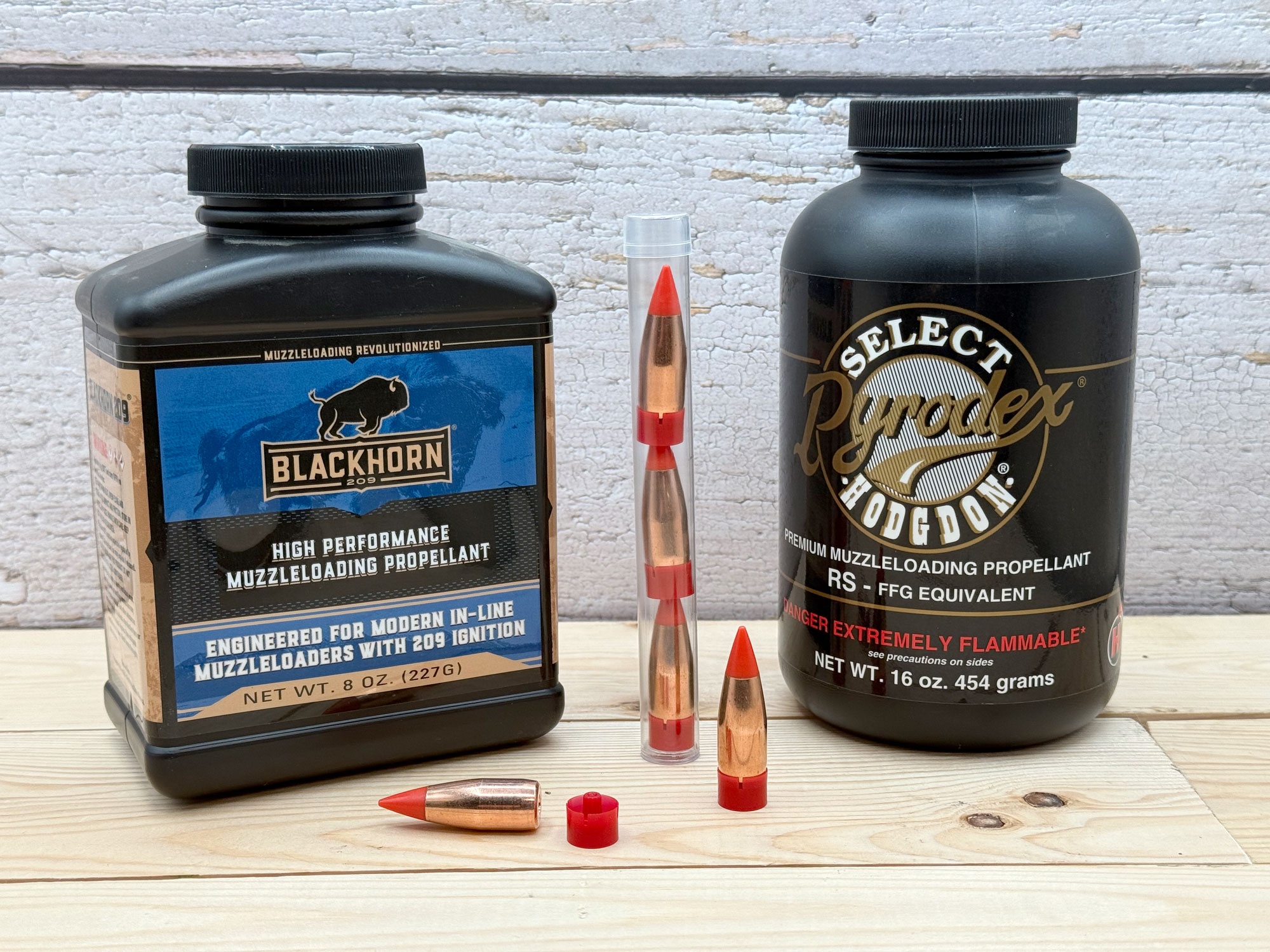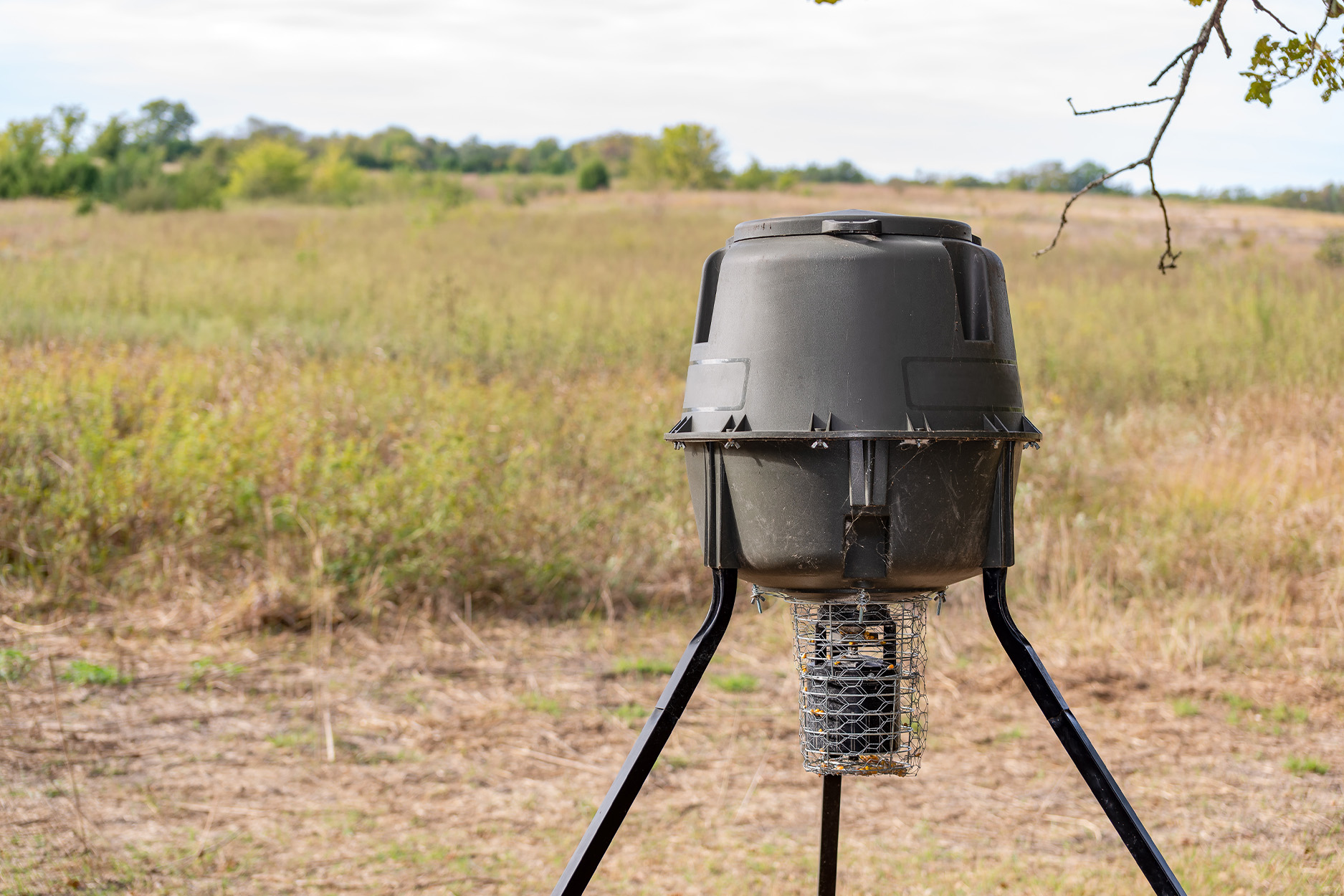Hornady’s Bore Driver ELD-X, Field and Range Tested

We may earn revenue from the products available on this page and participate in affiliate programs. Learn More ›
I froze as the buck did, looking at his broadside silhouette through the tall prairie grass. Experience told me it was over before he bounded past the horizon. I would need to take about six steps to a clear shot. It might as well have been sixty. I’d never make them before he leapt out of sight. So I just watched. It would have been a shame to shoot one on the first stalk anyway.
My first real mule deer hunt was a long time coming. I’d made meager efforts as a kid growing up in Colorado during archery season, and once drew a rifle tag that I never did fill. Nearing the age of 40, I came to the Nebraska sand hills to hunt deer during the state’s muzzleloader season — specifically to test Hornady’s new .45-caliber Bore Driver ELD-X bullets in conjunction with Leupold’s VX6HD Gen 2 riflescope.
Muzzleloader projectiles have come a long way since the patched roundball and basic lead conical. They’ve made modern in-line muzzleloaders more accurate and capable hunting tools, and the Bore Driver ELD-X is one of the most advanced yet. It combines great accuracy with less drag and impressive terminal performance characteristics — more similar to a rifle bullet than a smoke-pole slug.
Hornady Bore Driver ELD-X Specs
See It
Pros
- Accurate
- Built for both expansion and penetration
- Best-in-class BC
- Easy to load
- Caliber: .45 (.449 inches) (tested)
- Weight: 280 grains
- G1 BC: .338
- Tip: Polymer
- Coating: Drawn copper jacket
- Profile: Slight secant ogive
- Skirt: Polymer with post
What Makes the Bore Driver ELD-X Different?
There are a couple common styles of conical muzzleloader projectiles, saboted and skirted. Saboted bullets are smaller than bore diameter — often .050 inches smaller — and are nested in a plastic sabot or sleeve that is loaded into the muzzle. Upon discharge, the sabot gets the bullet spinning then peels away after it exits the muzzle. Skirted projectiles are similar to some of our oldest conical muzzleloader bullets like the Minie balls used in the Civil War.
Minie balls and traditional projectiles still made today, such as Hornady’s Great Plains bullets, have a hollow base which forms a skirt. Upon ignition, the skirt obturates or expands outward into the rifling. This both seals the bore and gives the rifling the grip it needs to spin the bullet. Several popular modern muzzleloading bullets use polymer skirts to accomplish the same task. The Bore Driver ELD-X, however, is set apart from the competition by several key features.
The Skirt
It’s likely that the Bore Driver ELD-X will mostly commonly be compared to the Powerbelt ELR projectiles, and for good reason. The Powerbelt is one of the most common muzzleloading projectiles, and has a polymer skirt that fits onto a post which protrudes from the rear of the bullet. The skirt is pushed out into the rifling by expanding gasses and drives forward on the projectile, applying enough pressure to force the bullet to expand slightly into the rifling.
The Bore Driver’s skirt is different, and has a much more rigid connection with the bullet during firing. The skirt has a post that fits into the bullet rather than onto a post that is part of the bullet. It has ridges that run parallel to the bore and expands to grip the bullet from the inside as it’s driven forward. There is a small bit of exposed lead inside the rear of the bullet cavity into which the ridges on the post press.
Not only does the skirt push forward, the post actively expands the shank of the bullet into the rifling and applies torsional pressure to help spin the bullet with the rifling as it’s getting moving. The Powerbelt design doesn’t have any mechanism to accomplish that and relies totally on bullet compression to obturate and seal the bore. The front of the ELD-X skirt also pinches down on the boat tail of the bullet as gasses are driving it forward. Upon muzzle exit, the skirt peels away similar to a sabot. In my accuracy testing, I found most of the bullet skirts about 30 yards downrange.
The Jacket
Another feature that sets the Bore Driver ELD-X apart and elevates it beyond the capabilities of many common muzzleloader projectiles is the drawn jacket. It’s constructed more like a rifle bullet and features a tapered jacket that thickens near the base and incorporates an interlock ring near the rear to aid weight retention and penetration. The large polymer tip initiates expansion at low velocities common to muzzleloaders.
A key difference between the Bore Driver and some of the other muzzleloader projectiles is that others are often copper plated, not jacketed. The thin coating on a plated bullet doesn’t behave the same as a well-designed jacket, and a lot of these bullets have a reputation for being very soft and struggling to penetrate some larger game.
The Profile
Hornady’s muzzleloader projectile has a best-in-class G1 BC of .338 for the .45-caliber version. It’s got a gentle ogive, boattail, and generally sleek construction compared to other bullets. Paired with good accuracy and jacket design, these bullets make longer shots out to 300 yards quite reasonable.
A Fine Buck
Good company makes a good hunting camp, and the jokes and shit-talking had been flowing for a couple of hours before my friend Colton Bagnoli settled our banter by saying “hey I’m pretty sure that’s a buck.”
We had the spotting scope up to look at a group of bedded does atop a tall sand hill a thousand yards distant. It was the tallest hill we could see — a pinnacle in an otherwise sea of rolling prairie. It was a buck. Colton had seen an antler, parallel with the ground, sticking over the brush as the buck rested his head on the ground.
As our friend Justin Vinton and I crept up a shallow draw to close the last hundred yards to shooting distance, we flushed a sharptail grouse which flew directly to where the deer were bedded. We continued. Eventually we caught sight of a doe, but the jig was up. Before I could clear the grass for a shot, the buck bounced away with his harem. I took a few minutes to watch him from a half mile away before we reluctantly made the trek back to our party.
Second Chance
As the day went on, we intentionally hunted our way in the direction the buck had gone, stopping at high points to glass. Early in the afternoon, we rounded the bend in a sandy two-track and saw the buck skylined about 600 yards to our left. Justin and I quickly slipped into a draw and closed the distance, angling in the direction the buck and his does were feeding.
Through my many years of hunting Dall sheep in Alaska, I’ve become a nervous wreck when it comes to peeking over ridges and skylines. Despite my best efforts at stealth, I have too often peeked over the crest of a hill only to find myself in locked gaze with the animal I’m after — the momentary pause giving me time to think about my mistake before my would-be trophy bolts out of my life forever. But this time, I could see the buck clearly, at about 150 yards, through the winter prairie straw. I took half a step back and spread the legs of my tripod.
“You want to crawl up farther?” Justin whispered.
My reply was to take two or three quick steps up the hill, just far enough to clear the grass. I set the tripod, and settled the crosshairs on the deer, just as his eyes swung over to my blaze orange. The rest of our gang heard the whop of the bullet hitting the deer from half a mile and were hurrying up as I admired my first mule deer buck.
Post Mortem
Things often happen fast, and the buck which I’d thought to be standing perfectly broadside had been quartering to. I hit him in the middle of the ribs, and when I skinned the deer, I found the bullet under the hide having passed through his off-side hip. It had penetrated 24 inches, expanded to .720 inches, and still retained 164.7 of its original 280 grains.
On the remainder of the trip, the two other bucks taken had a pass-through and one bullet was recovered under the off-side hide after busting through both shoulders. For some of our limited entry muzzleloader moose hunts in Alaska, I would have thought twice before using a .45-caliber projectile. I’ve killed black bears and a grizzly bear with a .50-caliber patched roundball — and without using a really heavy, soft projectile, it’s arguably less effective than any given medium- or smaller-caliber centerfire rifle with a decent bullet. I wouldn’t have really considered a .45-caliber. This changed my mind.
The weight of the 280-grain bullet combined with its dramatic expansion and good penetration would give me confidence on virtually any North American game within reasonable parameters.
Testing on the Range
I got a look at what the Bore Driver ELD-X bullets could do on game in Nebraska, but to call a single shot fired a test is silly. We had two rifles on the trip, a CVA Accura MR-X and a Traditions Vortek Strikerfire Vapr. I got one of each to collect more in-depth accuracy data.
Muzzleloaders are much more time consuming to shoot and difficult to load consistently, which I took as more reason for me to collect a 20-shot aggregate groups to zero and analyze the capability of each rifle — similar to how we do things with centerfire accuracy data collection.
We hunted in Nebraska using Blackhorn 209 powder, which is the most ideal propellant for these bullets. There really isn’t anything else comparable. The problem is that Blackhorn 209 is both hard to get and extremely expensive here in interior Alaska. For most of my accuracy testing, I decided to use a modest charge weight of Pyrodex Select. It’s a granular black powder substitute that I already have a good quantity of.
The downsides of Pyrodex Select are that it fouls much more quickly and produces lower velocities than Blackhorn 209.
Protocol
For all accuracy testing, I pre-weighed charges of 57 grains by weight — 80 volumetric grains.
To test the MR-X, I used the Variflame conversion kit and Winchester LRM primers. I fouled the bore with two shots, used a spit patch and two dry patches to remove excess fouling, then fired four five-shot groups from 100 yards. After each five-shot group, I repeated the spit-patch procedure to allow consistent bullet seating.
I tested the Traditions Vortek in a similar manner, but with some differences. I used Federal 209 primers for ignition, and spit-swabbed out the bore after each shot and fouled with two primers. The Traditions muzzleloader has a tighter bore than the CVA and fouling accumulating in the breech prevented consistent bullet seating even after one shot when using Pyrodex.
Accuracy and Velocity Data
I did have a limited quantity of Blackhorn 209 to try, so I shot a five-shot group at 300 yards with both it and the Pyrodex Select to get a reasonable velocity expectation. I used a slightly higher 70-grain-by-weight charge of Blackhorn 209, or 90 grains by volume — the same charge weight I shot my buck with. Velocity over five shots was 1,942 fps, producing a 3.9-inch 300-yard group.
| Rifle | Avg 5-Shot Group Size | 20-shot Aggregate | Mean Radius | Avg Velocity (fps) | Velocity ES (fps) | Velocity SD (fps) | 300-Yard 5-shot Group Size |
| CVA Accura MR-X | 2.41 in. | 3.63 in. | .93 in. | 1,584 | 226 | 56.9 | N/A |
| Traditions Vortek Strikerfire | 1.66 in. | 2.97 in. | .91 in. | 1,570 | 94 | 38.7 | 3.6 inches |
I was pleased to see such good accuracy out of both rifles. Though group sizes and 20-shot aggregate group sizes are different, there isn’t as much of a performance gap as you might think. If we look at mean radius — which accounts for every shot fired — accuracy is nearly identical. Statistical relevance is important, even for pain-in-the-ass muzzleloaders. One could argue, it’s even more important since systems that are less precise require higher sample sizes to accurately represent performance.
The takeaway? The Bore Driver ELD-X is an accurate projectile, and certainly capable of reasonable accuracy for shooting to 300 yards or more. Ethical limitations, and understanding them, are important for hunting with a muzzleloader but, objectively, the bullet is capable.
Final Thoughts
Seeing the Bore Driver ELD-X bullets in action really changed how I think of things in terms of muzzleloaders. A 280-grain bullet that expands rapidly but penetrates deeply and offers great accuracy leaves little reason for me to stick with a .50 caliber. If I’m feeling nostalgic, I’ll still tote my Kentucky rifle percussion gun with a patched roundball. But if I’m trying to take advantage of a muzzleloader season to put meat in my freezer, I’ll be toting one of these .45-cals and an ELD-X.
Read the full article here









